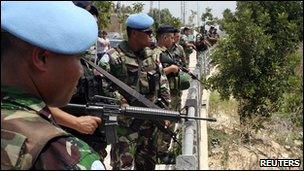Press review: Israel-Lebanon clash could spread
- Published

Tensions are often high along the heavily fortified frontier
Commentators in the Middle East have expressed fears that yesterday's clash on the Israeli-Lebanese border could further undermine the region's stability.
The two sides blamed each other for the confrontation. While Israel's press praised its military's "considered" response to being fired upon, Lebanese pundits called on the UN to recognise that Lebanon had been the victim of an attack.
Commentators across the Middle East worried that any escalation of tensions could spark a wider war in the region.
ALEX FISHMAN IN ISRAEL'S YEDIOT AHARANOT
A hair's breadth lay between a localised incident and setting the whole of southern Lebanon on fire. Immediately after the shooting at Israeli army soldiers there was a decision to be made in Israel: whether to put into practice a plan to attack and destroy a long line of Lebanese army targets along the length and breadth of southern Lebanon. This would have drawn a counterattack from the Lebanese army and Hezbollah ... In the end, a considered decision was made.
AMOS HAREL IN ISRAEL'S HA'ARETZ
The incident on the Lebanese border is the gravest of its kind since the Second Lebanon War [in 2006] … what we have here is a limited incident, but its repercussions could be serious. The central question is whether Israel and Lebanon will be wise enough to defuse the situation and prevent a sharp escalation in the next few days.
OFER SHELAH IN ISRAEL'S MA'ARIV
[Israel] decided yesterday on a localised operation ... Israel is well aware of the international protection the [Lebanese] army has, provided mainly by the US. No one believes the Lebanese army really defends the border with Israel from hostile activity but it is still preferable to a situation in which there is no army at the border, the UN [peacekeeping force] is expelled by Hezbollah and what was presented as an achievement at the end of the Second Lebanon War is lost.
RAJIH AL-KHURI IN LEBANON'S AL-NAHAR
The Lebanese army was the victim of this attack, yet it is prepared to oppose any offensive onto Lebanese territory and will retain its position on the borders to face the Israeli enemy, which continues to threaten it. [Israel] was not satisfied with accusing the Lebanese army of initiating the exchange ... but also tried to beat the Lebanese government to lodging a complaint with the UN Security Council.
RAFIQ KHURI IN LEBANON'S AL-ANWAR
The UN Interim Force in Lebanon, responsible for helping the [Lebanese] army maintain its authority on its own territory, is tied by strict laws of engagement ... when clashes happen, it is a mere witness. Furthermore, the UN Security Council, with which both Lebanon and Israel have lodged a complaint, is not the International Criminal Court but a council whose decisions are governed by international interests and politics.
TAHIR AL-IDWAN IN JORDAN'S AL-ARAB AL-YAWM
There is a blue line between Lebanon and Israel - there are no peace accords, conventions or embassies ... From time to time, analysts expect Israel is to launch a new war on Lebanon. But no one predicts that the Israeli leaders will gain any sort of victory. Lebanon is the most steadfast Arab nation in opposing the enemy despite its divisions, ethnic clashes and weak military and financial capabilities.
MUWAFAQ MATAR IN THE PALESTINIAN AL-HAYAT AL-JADIDAH
Israel's aggression against the Lebanese army yesterday ... shows that Israel is preparing the region for a new war ... the repercussions will not include only the Lebanese and Palestinian arenas but will also reach Tehran.
BBC Monitoring, external selects and translates news from radio, television, press, news agencies and the internet from 150 countries in more than 70 languages. It is based in Caversham, UK, and has several bureaux abroad.
- Published4 August 2010